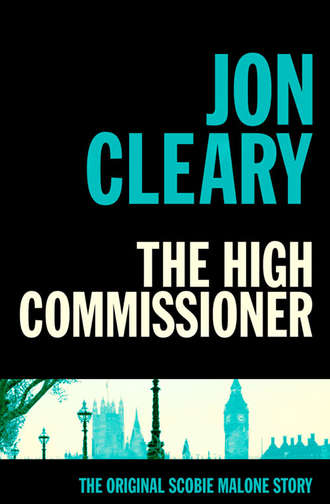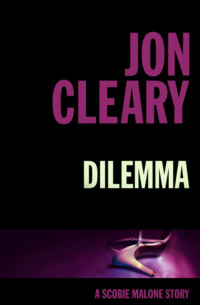
Полная версия
The High Commissioner
“But Flannery, he’s not thinking of going into Federal politics, is he?”
“Of course not. He’s king here in New South Wales. Why would he want to go down to Canberra, just be one of the princes? No, this is just a personal feud between him and the P.M.”
“And Quentin – what’s he? The shuttlecock?”
“He’s a murderer, Scobie. That’s all you have to think of him.”
They had reached the entrance to the shabby old tenement that was Police Headquarters. Amid the blinding dazzle of the steel-and-glass cliffs that surrounded it, it looked like an ancient monument of dubious origin, perhaps the only building ever erected by the aborigines. The law in Australia had always been the poor cousin of government; what right had a copper to be comfortable? They went into the musty lobby and ascended in the antique lift that creaked like the machinery of law itself.
As they got out of the lift Leeds handed Malone the file. “Read that, then bring it back to me. Keep the carbon of it, you might need it in London, but don’t let anyone here see it. It’s top secret. At least it is for another week. Then I shouldn’t be surprised if Flannery has posters made of it and stuck up all over Sydney.”
Malone took the file and went looking for an empty office. Most of the staff were out at lunch, but he himself had no appetite for food just now. Disturbed by what he had witnessed and been told this morning, excited by the sudden prospect of his first trip abroad, he wanted only to get into this case at once. He found an empty room, sat down in one of the uncomfortable chairs, opened the file and began his acquaintance with John Quentin, born Corliss, ambassador and murderer.
III
In a comfortable chair in a luxury apartment on the other side of the world, Madame Cholon looked out at the soft London drizzle of rain and nodded her head emphatically.
“The man to kill,” she said, “is the Australian High Commissioner.”
The three men with her said nothing. Two of them had learned not to answer her till she looked directly at them for comment; the third, Pallain, was still feeling his way with her. She stood up and, the silk legs of her tailored slacks hissing together, she crossed to stand at the window. Down the road the Science Museum bulked like a dark cliff through the grey rain; Kensington was slowly being washed off the map. She had been in England a month now and she hated its greyness, its wetness and its cold. She shivered and pulled up the collar of her cashmere cardigan.
“This conference is not going the way we want it.” She spoke French, in a high soft voice, for the benefit of Pallain; she knew that he could speak Vietnamese, but she had never heard him speak anything but French or English. He was a snob, but she was sometimes that herself. “Something has to be done to disrupt it. This man Quentin is the one who is now dominating it, so he is the obvious one to be eliminated.” Below her in the street an ice-cream van went slowly by, its bell tinkling with ridiculous optimism in the cold grey day. What optimists the English were, always confident the sun was about to shine! She preferred the French, with their cynicism and their pessimism; one always knew where one stood with pessimists. She turned back to the three men, all of them with at least a strain of French blood in them. “Do you not agree?”
Pallain scratched the stubble of beard that always began to appear on his face at this time of day. He had more French in him than the other two men: his father had been a hairy sergeant from Carcassonne who had died in the mud at Then Bien Phu, leaving behind him a twenty-year-old son whose birth he regretted as much as his own death. “I don’t see the point of killing the Australian.”
Madame Cholon sighed, not attempting to hide her impatience with Pallain’s lack of imagination. Legs still hissing like singing snakes, she came back and sat down. “If he is killed, who is going to be accused of it? Not us, because no one knows of us. But everyone else with an interest in our country will be suspected. The Americans will accuse the Chinese and vice versa. The same with the South Vietnamese and the Viet Cong, the Catholics and the Buddhists. Why, even General de Gaulle might be suspected!” Her smooth schoolgirl’s face showed a schoolgirl’s spiteful humour. “And as soon as suspicion sets in, that is the end of the usefulness of the conference. It will be adjourned, just like so many other conferences. The war may stumble on, but there will be no real government in Saigon, just as there has not been for the past two years. Anarchy is the climate we want.”
“It may not be easy,” said Pallain. “I mean, killing the Australian.”
The other two men nodded. Truong Tho and Pham Chinh were both small men, and the French blood in them was two generations old and poor vintage at that. They were not strangers to murder, but they were strangers to London and the big city made them ill at ease and even a little frightened.
“I love to gamble,” said Madame Cholon. “But I do not think the odds in this case have to be against us.”
The three men knew whom the betting would be against: themselves, not Madame Cholon. Pallain said, “London has a very clean record when it comes to assassination.”
“Then it is time its record was spoiled. The English are too smug about their dull way of life. Reading their newspapers, one would think the rest of the world was made up of barbarians.”
Pallain hid his smile, recognising a barbarian when he saw one and being afraid of her. “How soon do you want Quentin–er–eliminated?” He wanted to smile again, embarrassed by the gangster phrase. He had spent all his adult life with gangsters of one sort or another, but he read Racine and dreamed of a life among such people as Proust had known. “We shall have to make plans.”
“Naturally,” said Madame Cholon, her voice tart with contempt for the dullards she had to employ. In the street below she heard the tinkling of the ice-cream van’s bell, and in her homesick ear it sounded like an echo of the temple bells along the Mekong River. She looked out of the window again, saw the thin explosion of sun behind the range of clouds far away to the west, and felt her own sudden flash of optimism. “One does not kill a man without making plans.”
Chapter Two
John James Quentin (Corliss):
Born: Tumbarumba, New South Wales, July 15, 1915.
Parents: Peter Corliss and Ida Fahey Corliss died in car accident October 12, 1925. Corliss, only child, then raised by aunt, Mira Fahey, spinster, who died January 22, 1934.
Corliss moved to Sydney February 1934, joined Metropolitan Water, Sewerage and Drainage Board as trainee surveyor.
Married Freda Wiseman, previously Weitzmann, August 20, 1936. No children of marriage. Weitzmann had arrived in Australia alone from Vienna January 1936. No relatives of hers have been traced.
Stabbed corpse of Freda Corliss discovered by neighbour December 9, 1941. One wound in right breast, inflicted by sewing scissors.
Corliss disappeared. Reappeared as John Quentin May 12, 1942, date of voluntary enlistment in Royal Australian Navy at Perth, Western Australia.
Married Sheila Redmond, daughter of Leslie Redmond and Elizabeth Cousins Redmond, both deceased, Perth, July 10, 1942. No children of marriage . . .
“Would you please fasten your seat belts? We shall be landing at London Airport—”
Malone closed the file and put it back in his brief-case. It was a comprehensive file, sixty pages thick, a monument to the diligence of the researcher. On the trip over Malone had read it three times, reading it at night when the passenger beside him, a talkative grandmother, had been asleep. She had got off at Zürich (“Then I’m going down to Rome. To see the Pope. I’m a Presbyterian myself, but we can’t all be bigots, can we?”), and the seat beside Malone had since been empty. In this last half-hour, free from interruptions and the grandmother’s inquisitive eye, he had been trying to memorise the summary that was attached to the file. The more he read, the more he could taste the relish with which the researcher had worked: he really had enjoyed the change from dry political statistics and trying to guess the voters’ intentions. John Quentin (or Corliss) had been pinned to these pages like a dead butterfly.
But the researcher had, in the final analysis, failed. He had pinned a specimen to a board, described its history, illustrated some of its characteristics; but John Quentin was still no more than a name (or two names) and a collection of facts; the researcher had not discovered what made him tick. And Malone had begun to feel the first stirring of an unease that had not troubled him since he had been sent out, years ago, to make his first arrest. Over the years he had come to appreciate that the less you knew about a man, the less you were involved emotionally when it came time to bring him in. Now, however, a personality, like a faint watermark, was hidden behind the typed facts; and, despite himself, Malone was intrigued by it. And for a policeman that way could lead to headaches. Subjectivity, he had heard Leeds say, was as corrupting as money.
Twenty minutes later the immigration officer was looking at his passport. “Police officer? On duty, sir?”
Malone shook his head. “Holiday.”
“Enjoy yourself.”
“Thanks,” said Malone, and wondered when he had last enjoyed an arrest. He could for a while hate a murderer who had committed a particularly horrible crime, the callous bashing of an old woman or the rape and killing of a young child; but later there would come the moments of doubt, the wonder at what had caused the flaw in the murderer. He didn’t believe all of the psychiatrists’ theories that the flaw in any man could be found in his childhood; he was old-fashioned enough to believe that some men were born bad. But why? He often asked himself, and left himself open to further questions that bothered him more than his colleagues suspected. He had often thought that he would like to have worked on the case of Cain. After that all other murder cases might have been simple.
The flight had been delayed for hours by storms in Zürich, and now it was late afternoon as he rode in in the airport bus to London. He looked out at England, catching glimpses of it from the motorway. He had never dreamed of travelling the wide world; well aware of his insularity and able to smile at himself, he had always been content with Australia and what it offered him. He was no explorer. Columbus, Magellan, Cook were men who probably would never have been happy while there was a horizon to draw them. Up till now, at thirty-one, horizons had meant little to him.
But England now was not something beyond the horizon; it was here around him. He could feel his excitement and interest growing; it was a pity that he was going to have no more than a day or two here. Perversely he began to hope that Quentin might fight the warrant, might ask for extradition procedure. It would play hell with Australia’s good name, but it would at least give Malone time to look at London. Then he cursed himself for his lack of patriotism. He was as hypocritical as Flannery.
He checked in at a hotel in Cromwell Road in Kensington. The affable Irish porter showed him to his room, talking a torrent all the way. “Ah, we get a lot of Aussies here at the hotel, sir. It must be a grand country, the numbers of you that are always coming over here.” Malone looked at the porter, but the latter wasn’t being sarcastic, only Irish. “Would you be on business, sir?”
“No, holiday.” Malone took out his note-book and looked at an address. “Is Belgrave Square far from here?”
The porter put down the bags. “Not far, sir. Was it an embassy you were wanting?” He had an Irishman’s frank curiosity: no one in Multinahone had had any secrets.
“No. Just friends.”
The porter’s eyebrows went up. “It’s a posh area, that it is, sir.”
“I have posh friends.”
The Irishman recognised the rebuff: some Aussies were just like the bloody English, keeping everything to themselves. He gave Malone directions on how to get to Belgrave Square and went out of the room, wondering why a man who stayed in a thirty-bob bed-and-breakfast room and who gave only a shilling tip should have posh friends in Belgravia.
Malone, a relaxed man who could sleep anywhere, even in an economy class airplane seat, was not tired by the long flight from Australia. He showered, changed into the light grey suit he had brought as a concession to the English summer, looked at his watch and decided to go and see Quentin at once. He had already made up his mind that he would confront Quentin with the arrest warrant at his home and not at his office at Australia House. He had never arrested a public official before and he did not want to be too public about it. Seven o’clock. The High Commissioner would probably be home now, doing whatever ambassadors did in their off-duty moments, having a bath, having a drink, wondering why they hadn’t taken up something easy like mountaineering or gun-running. It must be a bastard of a life, Malone thought: even the small diplomacies of a policeman’s life were difficult enough. But soon it would be over for Quentin.
Riding in the taxi towards Belgravia Malone tried to rehearse what he would say to Quentin; and after a while gave up. How did you face a man, secure in a new life and a new identity, almost impregnable behind the importance of his office, with a crime that was distant in time and place, ten thousand miles and twenty-three years from here and now? “Your Excellency, in regard to an ancient murder . . .” Malone gazed out of the window of the taxi, trying to make his mind a blank, trusting that the right words would come by instinct when the moment arrived. Habit, sometimes, was a comfort.
The taxi pulled in before the big four-storied house. Malone got out and conditioned by another habit paid the driver the exact amount on the meter.
“You Aussies,” said the driver, an economist from Bethnal Green. “I bet you don’t have any balance of payments deficit.”
Malone, who had never tipped a taxi-driver in his life, looked at the man blankly. “Belt up,” said the latter, and drove off, gnashing his gears instead of his teeth.
Malone shrugged, beginning to appreciate why someone had once written that the English were incomprehensible, and turned towards the house. He was surprised at its size; he was a long way from the five-roomed house in Erskineville where he had grown up. Then he looked at the other houses in the square and saw that some of them were even bigger; this square was a manifestation of living that he had only read about. This was diplomatic territory; above almost every entrance there jutted a white flagpole, like a single blunt-tipped mammoth’s tusk; the huge front doors had the magnificent discouragement of a butler’s façade. The heavily elegant cliff-faces of the houses hid secrets that exercised the British Government; but none of them held such a secret as this house behind him. He turned, hesitated, then pressed the bell firmly.
II
The door was opened by a butler, something Malone had never experienced in his life before. He had all the appearance of the butlers Malone had seen in films: tall, portly, his aristocratic nose pushed back by a smell not apparent to men with less sensitive olfactory organs. But when he spoke his rich purple voice had a foreign tinge to it, and at once Malone thought he had come to the wrong address.
“Is this the home of the Australian High Commissioner?”
“It is, sir. May we ask whom you wish to see?” Monarchs and butlers, Malone thought: who else has the right to speak in the royal plural?
“The High Commissioner. My name is Malone and I have a special message for him from the Premier of New South Wales.”
The butler looked suspiciously at him, then he stood aside, opening the door wider. Malone stepped into an entrance hall and waited while the butler, like a bishop on his way to the altar, did a slow march towards the rear of the house. Though the hall was only sparsely furnished, Malone was at once aware that he was on the close outskirts of luxury. Through a half-open door he caught a glimpse of a room that reminded him of illustrations he had seen in Vogue, a periodical that had once been delivered by mistake to the Murder Squad and reduced the officers there to a state of depressed inferiority. He turned his head and saw himself in a huge gilt-framed mirror: he looked at the stranger there who seemed so out of place. He shifted his feet nervously in the thick carpet of the hall, feeling as awkward as a three-legged colt. Suddenly he wanted this business of Quentin over and done with quickly. He would come back in his old age and look at London.
The butler came back down the hall with a girl. He stood aside, watchful as an old sea-lion; images kept flashing through Malone’s mind, but he could not see the butler as just a man like himself. The girl came forward.
“I am the High Commissioner’s secretary.” She, too, had a slight accent. Stone the bloody crows, Malone thought, whatever happened to the Australian accent? “What was it you wanted?”
“I have a personal message from the Premier of New South Wales.” He had no such thing; but he had not expected it to be so difficult to get in to see Quentin.
“A letter?”
“No, it’s verbal.”
“I’m sorry, but the High Commissioner is busy. Could you not come to Australia House tomorrow?”
Malone shook his head, trying not to appear too stubborn. He liked the look of the girl: tall, good-looking, blonde, and with a poise about her that he had looked for in the girls he had known and had so rarely found. But he sensed her impatience with him and he was aware of the cold disapproving eye of the butler. “The message is urgent and important.”
The girl looked at the butler, and Malone read the message that passed between them. They think I’m some crank! He was appalled at the idea, remembering his own impatience as a policeman with cranks. His hand moved towards his pocket to take out his identification badge. Then his hand dropped back to his side and he smiled to himself at the situation and his own reaction to it.
“Perhaps if you told the High Commissioner that the message concerns Tumbarumba, he might see me.”
“Tumbarumba?” The girl was now convinced she was dealing with a crank.
“It’s a town, not a disease.” This comes of employing foreigners, Malone thought; and began to feel more xenophobic by the minute. He had always been tolerant of the foreign migrants who had come to Australia, even those he had had to arrest; but now these two foreigners, the girl and the butler, were beginning to annoy him with their attitude towards him. Deep inside him he knew that regardless of their accents, they were only doing their job of trying to protect the High Commissioner from uninvited and unwanted guests. But they were also trying to prevent him from doing his job, one that he wanted finished as soon as possible. He was out of his depth here, in alien territory no matter that his country’s ambassador lived here, and he wanted to be on the plane at once for Sydney, home and an atmosphere where he didn’t have to be so secretive. He said sharply, “Just tell the High Commissioner that I’ve come from Tumbarumba.”
The girl raised an eyebrow, as if recognising for the first time that Malone was accustomed to some authority. Without a word, but with a nod of warning to the butler, she turned and went back along the hall. Malone and the butler stood watching each other in the huge mirror: they were posed in the gilt frame like a tableau titled Suspicion. Then the girl came back.
“This way, Mr.—”
“Malone.”
“Mr. Malone. The High Commissioner will see you.” Her poise had been cracked a little; there was no mistaking the surprise she felt that the ambassador had agreed to see this crank.
She led Malone down the hall, pushed open a door and stood aside. “Mr. Malone, sir, from Tumbarumba.”
“We are not to be disturbed, Lisa,” said the man standing in front of the marble-fronted fireplace. “By anyone.”
The girl closed the door. Malone, feeling more awkward than he had ever felt in his life before, stood watching the man across the room from him. He had checked on newspaper photographs of Quentin; but they had not done the man justice. He was taller than Malone had expected, and slimmer. His thick wavy hair, brushed close to his head, and his military moustache were grey, but somehow they did not add age to his lean high-cheeked face; Malone would have guessed him to be at least five to six years younger than the age that showed against him in the file. The wide sensitive mouth looked as if it knew the exercises of humour, and the dark blue eyes looked as if they, too, could smile with enjoyment. But not now: eyes and mouth were both stiff with suspicion.
“What is it, Mr. Malone?” Quentin’s voice, Malone guessed, would normally have been deep and pleasant. Now it was strained, a little high: the Australian accent was evident, the vowels flattened. “My secretary said you were from Tumbarumba.”
“I’m from Sydney, sir. Detective-Sergeant Malone.” He produced his badge, glad of the opportunity to do so; for the time being there was no longer any need for secrecy. “I’m sorry, Mr. Quentin, but I have a warrant for your arrest for the murder of your wife Freda.”
Quentin, for all the stiff suspicion in his face, had been standing at ease before the fireplace. Now all at once he seemed to wilt: years piled into his face like grey blood and he looked his age and more. Behind his head an ormolu clock ticked like a bomb; but the bomb had already gone off. The lips, as grey now as the moustache above them, grimaced in a thin smile.
“Tumbarumba – what a password!”
“I had to try something, sir. Your secretary is quite a watch-dog.”
“But not quite good enough. I should have warned her about policemen.” He put his hands together in front of his face and bowed his head like a man in prayer. Malone had seen many reactions to arrest and he had never got over his embarrassment at some of them. He just hoped Quentin was not going to start praying out loud. But then Quentin looked up and his mouth was twisted in the same thin grimace of a smile. “I’ve often wondered what I would say to you when you came. Somehow it was a speech that never got written. And I’m said to be a very good speaker.”
“I’d save it for the trial, sir. I’m supposed to warn you—”
“I know, Sergeant. But anything I may say now won’t help you very much. You wouldn’t be here unless you had a watertight case. You don’t go around arresting ambassadors to keep up your monthly quota, do you?” He smiled without rancour. As quickly as he had wilted he was now becoming philosophical. His voice had deepened, come under control again; the Australian accent was still there but less evident, the vowels were being given their full value. He moved towards a side table on which stood a decanter and glasses. “A sherry? Or don’t you drink on duty?”
“Where I grew up, sir, sherry isn’t considered a drink. It’s something you flavour jelly or trifle with.”
“You are looking a gift prisoner in the mouth, Sergeant. But I admire your sense of occasion. Sherry is for vicars and old ladies.” He smiled again, a much warmer smile. He put down the decanter without taking the stopper from it, pulled a long tasselled cord hanging beside the fireplace. When he turned back the smile had waned. “I must have grown up in the same sort of circles as you, Sergeant. A pity I ever left them. I wonder what Tumbarumba is like now?”
There was a knock at the door and the butler opened it. Quentin ordered Scotch, then turned back to Malone as the door closed again. He stared at the detective for a long moment, then he moved to a high-backed leather arm-chair and sat down slowly and a little wearily. He gestured at the room about him, and Malone, looking about him for the first time, saw that it was a small library. Books lined three of the walls: leather-bound volumes, large illustrated books, bright-jacketed novels, sombre-titled non-fiction: Quentin, or someone in the house, had a wide taste in reading. The fourth wall held some sporting prints: spindle-shanked horses straddled hedges, a fighter in long underwear posed behind bare fists and a walrus moustache. On a small desk a woman looked with calm eyes from out of a silver frame: she looked out of place beneath the sporting prints, too much of a lady.









